As a teenager, Patti Gray backed into caregiving at a local nursing home because it paid a few pennies per hour better than Dairy Queen, she said.
She went on to earn a registered nursing degree. She eagerly went to work in a hospital intensive care unit because she assumed it would be dramatic and heroic. She quickly learned a new lesson, she said: Dramatic, heroic interventions often felt all wrong.
But as a hospice nurse, Gray said, she saw patients and families at their “realest” — their long-term problems and dysfunctions as well as their strengths, skills and bonds on vital display.
“People say it must be so sad and depressing, but I didn’t find that,” Gray said. “I saw so many amazing things. I’m not a traditionally churched person, but I saw the human spirit perform miracles.”
For seven years now, Gray has been the owner of Angelbrook Senior Living, an upscale memory care home in the Mount Vista neighborhood. While she still does some hands-on care herself, Gray has mostly graduated to hiring and supervising a team of employees — and standing back while they make the mundane daily miracles that keep people in irreversible decline as happy and healthy as possible.
In Gray’s experience, the best caregivers seem to share a key formative experience: a loving childhood bond with an elder who likely wasn’t a member of the household. A teacher, a neighbor, maybe a nearby relative.
“That’s the click,” said Gray, who shared such closeness with her grandmother. “Seniors didn’t scare me. There was nothing intimidating about them. They were normal people with super-interesting stories to tell.”
Enlarge

Alisha Jucevic/The Columbian
Julie Williams, owner of the local branch of national chain Home Instead Senior Care, has a similar story. She grew up in a cold, rigid family, she said, and moved out as a teenager. Her savior was an elderly friend who thought for herself and taught Williams the same. “She wore slacks and reminded me of Katharine Hepburn,” Williams said.
According to Williams’ birth family, her de facto “Grandma” was literally headed for hell. But she and Williams nurtured one another until she died; what Williams learned, she said, was the beauty of caring selflessly for others. Even when they’re different and difficult. Even when it’s supposedly hopeless.
Red flags
Today, as an employer of caregivers, Gray worries. She keeps finding that today’s younger, entry-level applicants are less comfortable with older people and major messes than with technology and touch screens. More than once, she said, she’s fired caregivers after discovering Facebook messages they posted on the job. “Caring” for a patient while actually cruising the internet is way too careless, Gray said.
But, she added, driving patients through your own idea of a schedule or agenda is way too strict. “When a caregiver wants to be in control, when they’re focused on their own agenda, I can tell it’s not going to work,” Gray said. “Order, sequence, efficiency — they sound good, but they’re mostly for us, not the clients.”
A general eating and sleeping routine is usually a good thing, she said — for one thing, it avoids isolation — but there’s got to be plenty of individual flexibility, too. That’s especially true for modern adults who are used to being their own bosses, she said.
“I’m looking for people who can meet my residents where they are. I’m looking for a heart connection.” Julie Williams, Home Instead Senior Care
Not all adults with dementia get frustrated and angry to the point of physically lashing out, Gray said, but it’s far likelier to happen when a caregiver is being bossy or missing obvious warning signs. Job applicants who boast about enduring punches, kicks and bites don’t impress her, she said. “It means, they don’t get it.”
Even the wrong look on an applicant’s face can be a red flag. If you can’t discuss changing clients’ briefs or cleaning up bodily fluids without wincing, Gray said, you’re not cut out for this work.
“I am looking for people with skills and discernment,” Gray said. “I’m looking for people who can meet my residents where they are. I’m looking for a heart connection.”
High turnover
That heart connection is crucial for caregiver employers too, Julie Williams added.
“You can’t be in it for the money,” she said. “If you are … your employees will see that’s what your focus is. If you don’t mirror their intensity, they’ll see you as a fake. If they call into the office with concerns and you don’t act on them … they’ll see you as just an office where nobody cares.
“If you nickel-and-dime them, thinking this is how I’m going to save money …you’re shooting yourself in the foot,” Williams said.
“You can’t be in it for the money. If you are … your employees will see that’s what your focus is." Julie Williams, Angel Senior Living
Hourly pay has risen for Washington state caregivers in recent years, Gray said, to the point where it’s generally better than flipping burgers. But training and testing requirements have risen, too. Fast food remains “a heck of a lot easier,” she said. “You don’t have to pay for training and exams, and you generally don’t go home worrying.”
Gray’s experience mirrors national trends: it’s middle-aged workers who tend to become reliable, durable caregivers, while younger ones tend to burn out and give up. They don’t want to work evenings and weekends, Gray has found; they can’t fathom being deprived of their electronic devices on the job. The ones who do thrive as caregivers tend to reach still higher as registered nurses, she said.
“Caregiving is high-turnover, high-burnout work,” Gray said. “There’s only a subset who stays with it as their life’s work.”
Enlarge

Ariane Kunze/The Columbian
George Spooner: Sincere shining star, with hugs
George Spooner, 65, wants to give you a hug. He doesn’t care whether you’re a guy or a girl. He just wants to touch you.
“I’m a hugger. I’d much rather hug than shake hands,” he said. “If people are having a hard day, I touch them. When you feel like you’re at the bottom of a pit, it’s the best thing to really feel someone caring for you.”
Depending on the huggee, of course. Spooner asks first. Some men grumble back: “I used to hug my wife.”
“Men can hug, and it feels just as good” is Spooner’s standard retort. “It’s just love. Everybody needs it.”
This is a remarkable evolution for a man who used to avoid people. He preferred drinks and drugs, he said. He sacrificed two marriages to a personality that just didn’t like to talk — let alone hug and beam at people who often barely respond.
Unlike many folks who find a good fit as caregivers, Spooner was no natural-born nurturer. “I was one of the bullies,” he admitted. “I was the jock.” But as the youngest sibling of three, he must have absorbed some fine examples of nurturing; his mother and eldest sister doted on him, he said.
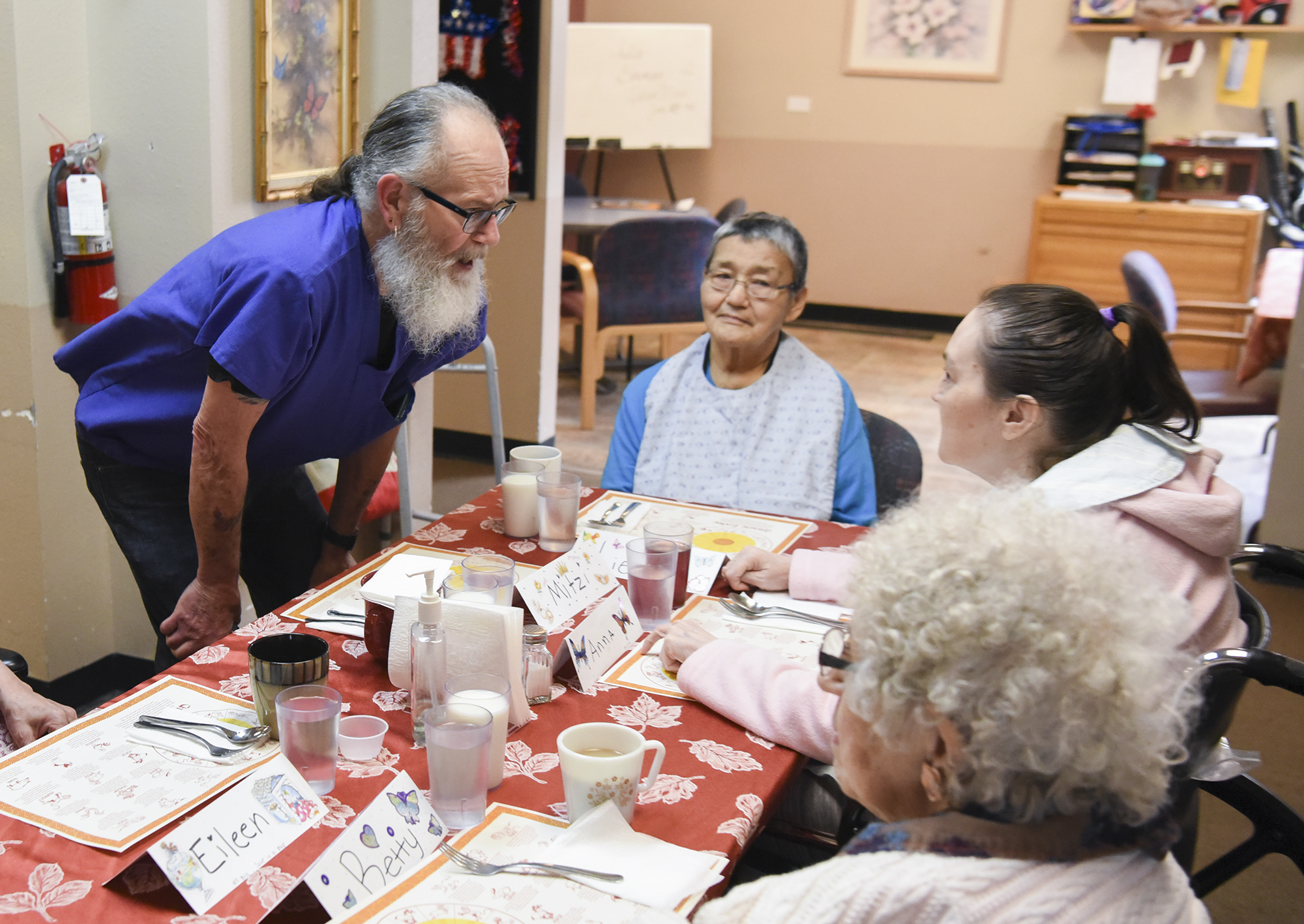
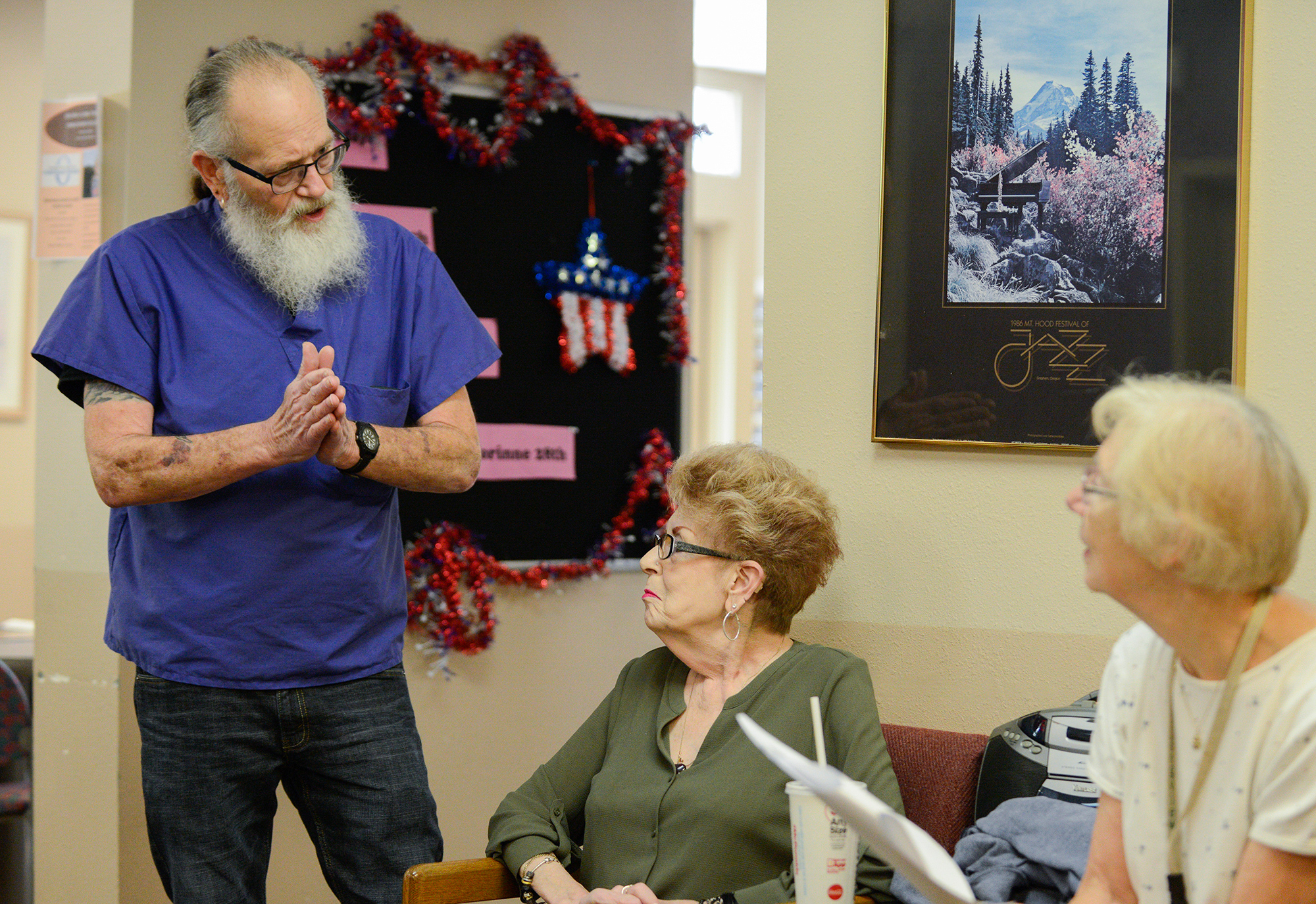
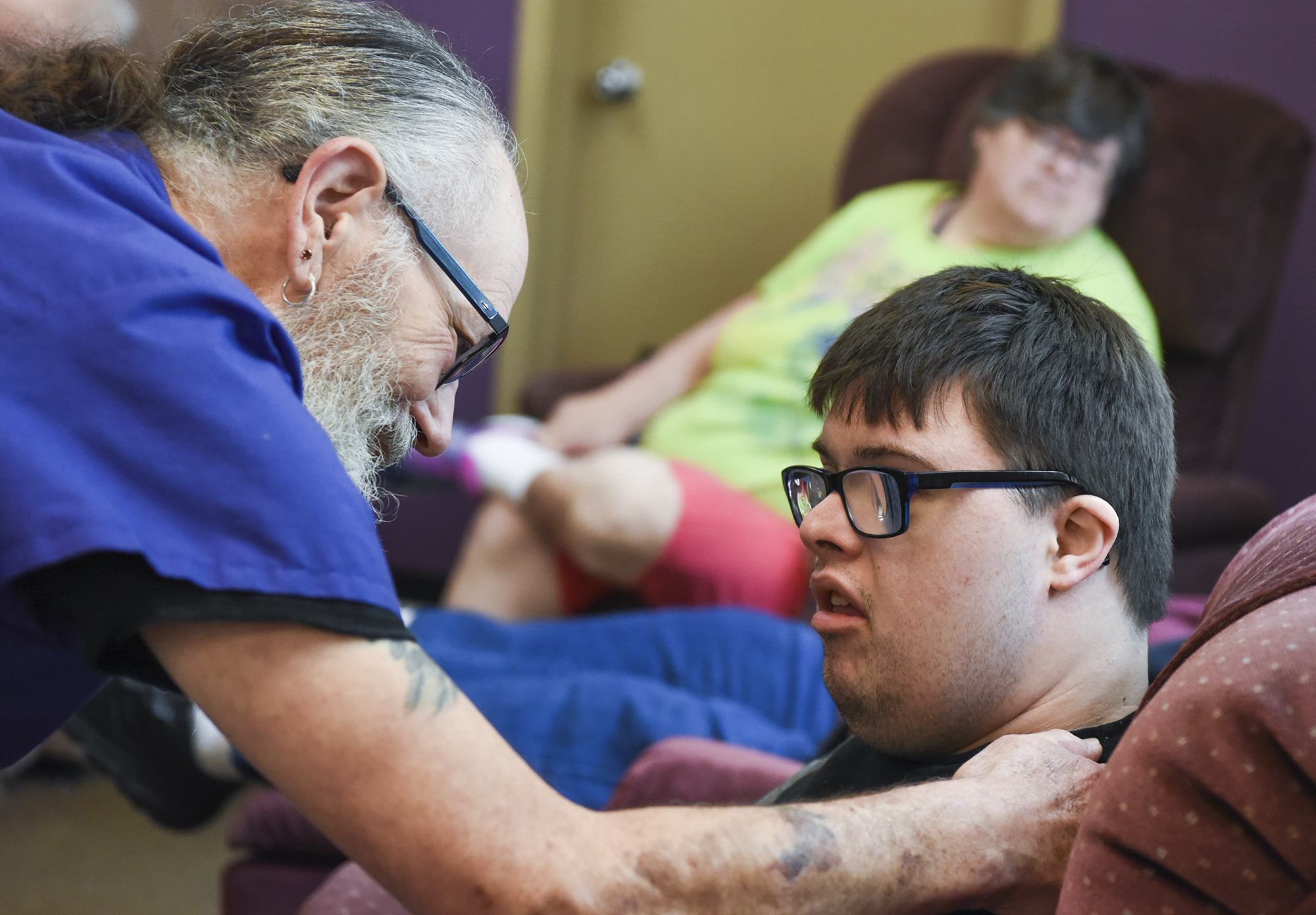
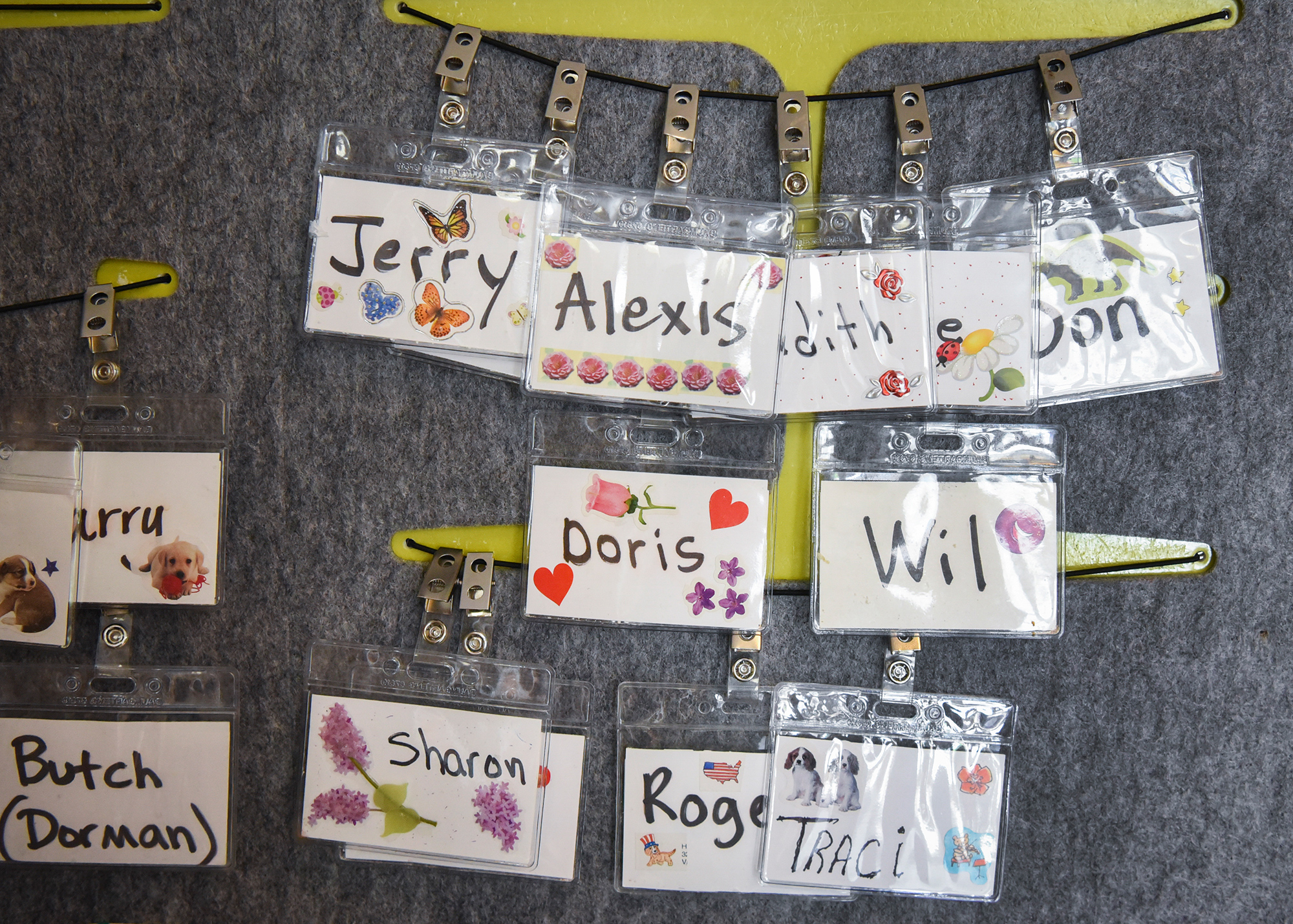
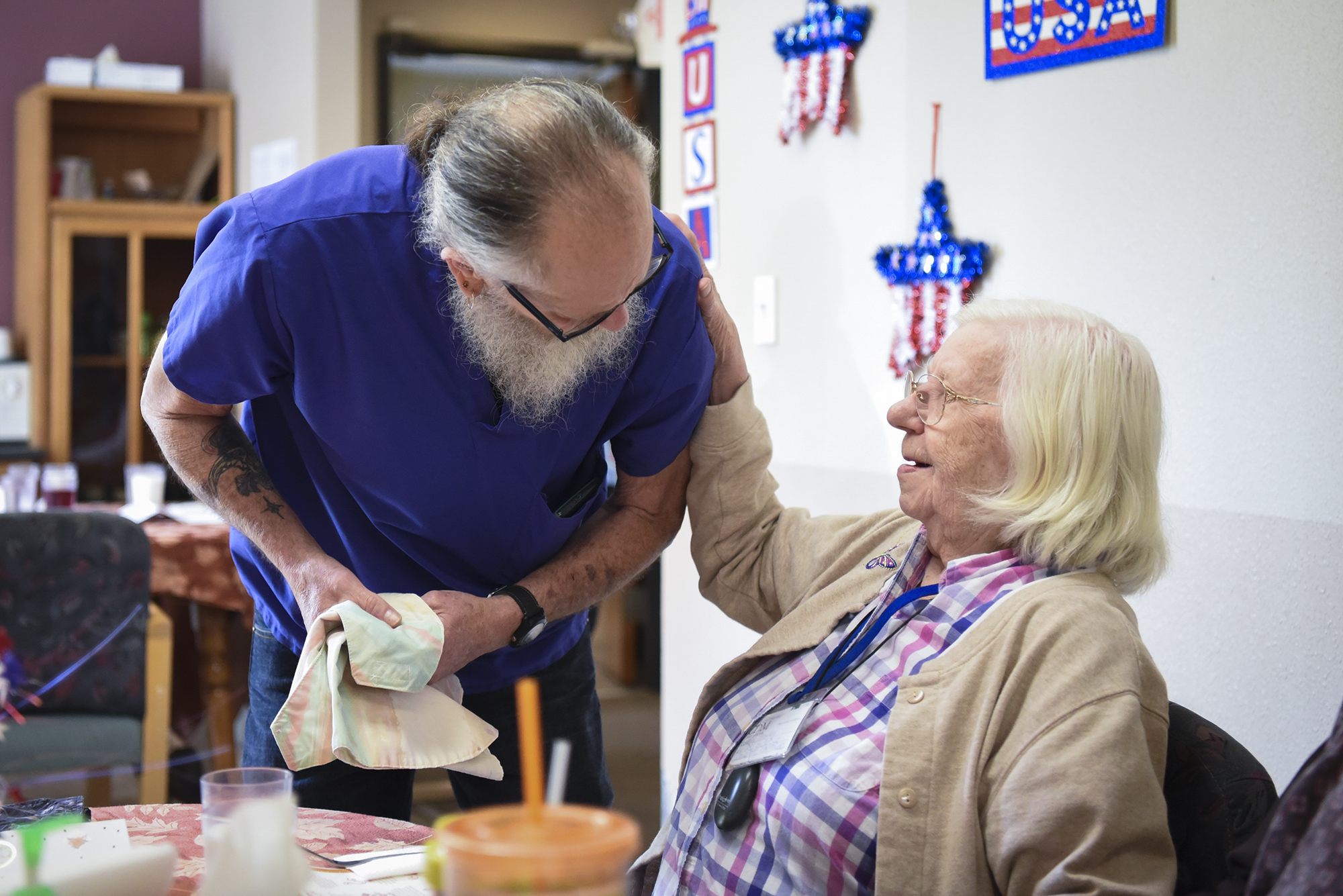
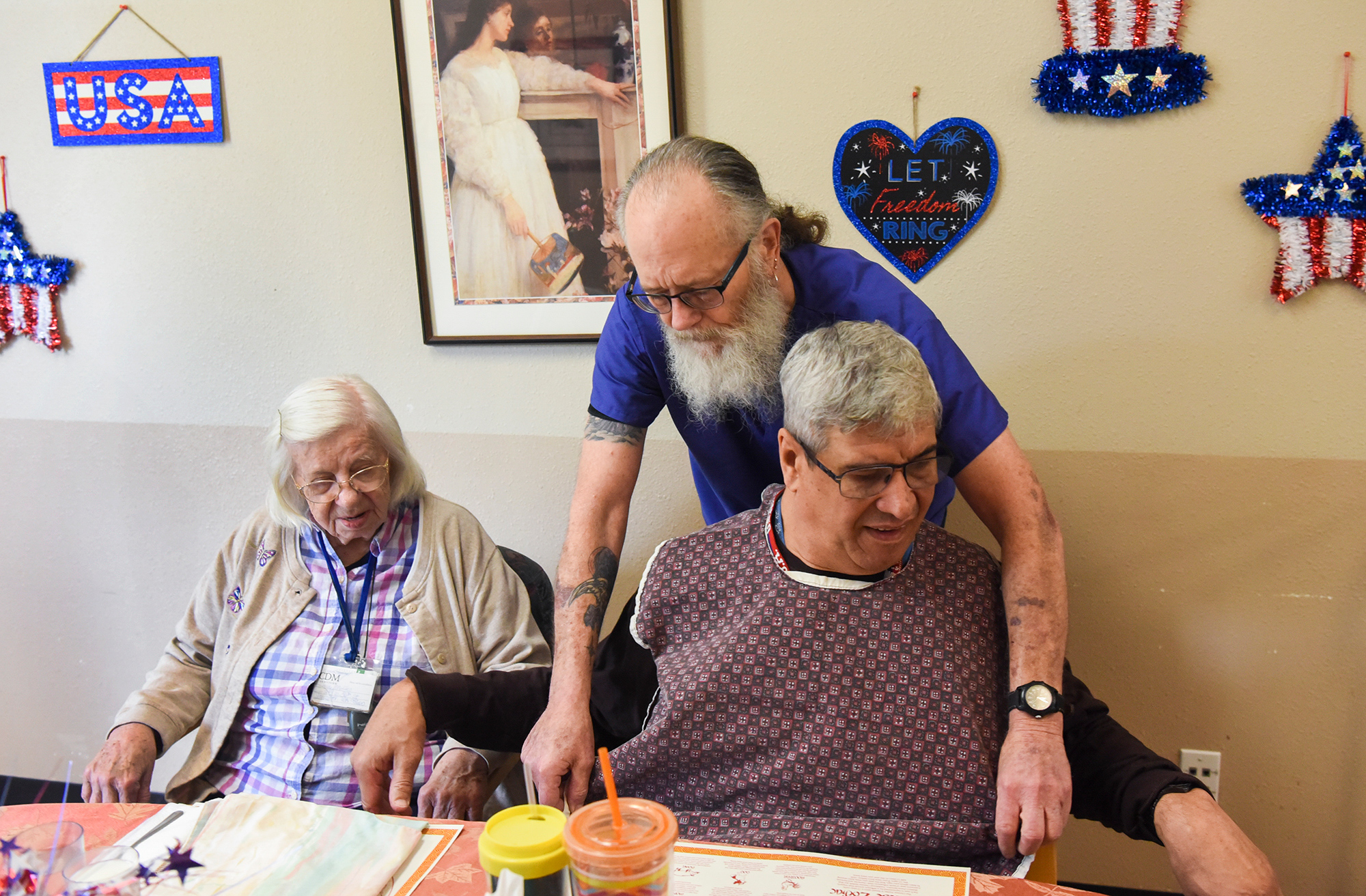
Still, Spooner chose trucking to earn his living specifically because “I wouldn’t have to talk to people,” he said. It wasn’t until he got caught in a dumb lie at work — he was running late, promised otherwise and earned his peers’ rage for it — that he realized “how important people are. That was the last time I ever lied to anyone about their needs. That’s when I started trying to get to know people,” he said.
Reset in Reno
Something else happened, too: Spooner’s third wife, Jackee, was diagnosed with multiple sclerosis. He was shocked when she instructed him to desert her. “You don’t know what you’re dealing with,” she told him.
Spooner told Jackee to have faith. “I love you and I’m not going anywhere — this time I mean it,” he said. He devoted himself to taking care of Jackee; he also scored a new part-time job, supervising disabled people doing menial factory labor at a slot-machine plant in Reno, Nev.
He was amazed to find himself “falling in love with all my clients,” he said. Spooner facilitated what seemed like miracles, as nonverbal clients made new friends. He got comfortable volunteering to help them with tasks like toileting.
That’s a universally dreaded and avoided word, he said — and of course it’s a universal need. “Everyone has the same exact problem and everyone is afraid to talk about it,” he said. “I know it’s hard to ask for help, especially when it’s this. Me, I don’t care. It’s just another thing you do.”
“It’s not a job. It’s a position of love. I really believe God put me here to do it.” Caregiver George Spooner
Jackee couldn’t stand the heat in Reno, he said, so the couple relocated north to Vancouver. Spooner got an itinerant caretaking job and then a part-time gig at downtown’s CDM Caregiving Services. While he’s there, other caretakers tend his wife in east Vancouver, he said. Then he gets right back to her.
“I do this 24 hours a day,” he said. “It’s not a job. It’s a position of love. I really believe God put me here to do it.”
Like candy
It seems right that Spooner recently received CDM’s “Shining Star” award, because that’s exactly what he does when he shows up three days a week: he shines at people.
Big, sincere smiles. Big, comfortable hugs. Spooner gives them out like candy. This isn’t silly surface stuff, he said — it’s crucial. Some clients are beyond verbal communication, and often they are confused, frightened and uncomfortable. Spooner’s loving hugs are the literal embodiment of reassurance.
He’s still amazed at his whole unlikely saga, he said. “I see what an important position this is. And, you know? Until I did this, I didn’t realize how people like me (could do it).”
Enlarge

Photo courtesy of Doc Davis
Doc Davis: Ironclad faith in face of loss
Doc and Faye Davis used to show up at CDM Services at about 11 a.m. on Wednesdays. Doc got Faye situated near the front of the room where she gazed at faces, beaming and silent. Doc bustled and joked while he set up his loudspeakers and karaoke system: “Some folks, if they didn’t have a sense of humor, they’d have no sense at all.”
Then he sat beside his wife, greeted his audience with some pro patter, touched a button that set his built-in band a-swingin’, and crooned a tune from 50 years ago:
“You keep me waitin’ till it’s gettin’ aggravatin’, you’re a slowpoke.
“I wait and worry, but you never seem to hurry, you’re a slowpoke.
“Dear, why should I keep trying to change you? It’s not the thing to do.
“I guess I’ll have to learn to be a slowpoke too.”
At first, Doc’s audience of about 20 adult day care clients barely reacted as he sang in a sweet, wobbly drawl. A few nodded along with the beat, or wiggled their hands. One fellow kept interjecting, “Is it lunchtime yet?”
But one woman told Doc, “You sing pretty. I love guitar music.” Another woman struggled to her feet to dance — and a grinning staff caretaker named George took her hands and waltzed her around in place.
That sweet, sad love song of many yesteryears ago seemed to size up Doc’s predicament with his nonverbal, mostly uncomprehending wife — except, he was quick to say, he’s got nothing but thanks for a great love and praise for a kind God. It’s not a predicament, he said, because he refuses to see it that way.
“Now this is Elvis Presley, so you better listen,” Doc warned before the next tune. “You don’t have to watch, though, because I can’t wiggle like he did.”
The guitar music fan asked if Doc sings for a living. The 82-year-old, who once considered a musical career, was flattered — but he laughed. “Faye is my full-time job,” he said. “She’s what I devote my time to and she’s worth every bit of it.”
Fractures and faith
Doc’s ironclad faith and faithfulness got built the hard way. He was a young child when his father disappeared — at a time when a husband leaving a wife was automatically considered the wife’s fault, he said.
“He wasn’t a good father. I made up my mind I was going to help my mother,” he said. But the reality was, he had to help himself too. “There was no home life. And there was no such thing as welfare,” he said.
Enlarge

Photo courtesy of Doc Davis
Doc loved to sing, and he got work in a hometown band while still a teenager — but he sampled just enough decadence on the road to turn against it. “That’s not a life,” he said. He already yearned for the normal home life he’d missed out on, he said.
But Doc’s first wife abandoned him and their children.
When he met Faye at church, her story was similar: a broken family in childhood, hunger for love and stability now. The couple married and went into Christian ministry in California and Oregon; Doc also worked as a grocer and butcher and did construction while Faye did accounting and other office work.
“She was a highly intelligent, highly capable woman,” Doc said. The couple retired and enjoyed traveling in their camper, which they frequently steered to Battle Ground to visit relatives. There was never a hint of any problem until Faye, behind the wheel, got lost on a familiar road, blew through a stop sign and caused an accident.
Nobody was hurt — but scans of Faye’s brain pointed to Alzheimer’s disease.
Truth and goodbye
Doc said he quickly got past the shock. Facing the truth is crucial, he said.
“The truth is an 800-pound gorilla,” he said. “You’ve got to face it. If you turn your back on it, it’ll destroy you.”
Doc’s truth: Mundane frustrations were nothing his faith couldn’t handle. He reads his Bible every morning. He got help from the couple’s relatives, who welcomed them into their Battle Ground home, and from CDM in downtown Vancouver, where he’d sometimes drop Faye off for a personal break — and other times provide karaoke for everyone. Whenever somebody else got motivated to take the microphone, he said, he knew he was reaching them and making them feel good.
“I love that woman more than I can say,” he said. “I don’t feel cheated; I have it made.” Messy work like changing diapers is nothing, he said, when you’ve achieved the stable, solid family life you always wished for.
But here’s more truth: In late June, just before The Columbian could return to a Doc karaoke session to photograph the fun, Faye took a spill and broke a hip. One day in early July, Doc combed Faye’s hair and told her, “‘Honey, it’s time for you to go home. I need a goodbye kiss.’ So she puckered up and gave me a goodbye kiss. And she went back into her coma. That was goodbye,” he said.
Faye died July 9 at age 85.
“I’m not going to go around feeling sorry for myself,” Doc said. “I loved that lady, but there’s no use sitting around grieving.”
Next month, Doc promised, he’ll be back at CDM with Wednesday morning karaoke.
Scott Hewitt: 360-735-4525; scott.hewitt@columbian.com; twitter.com/_scotthewitt